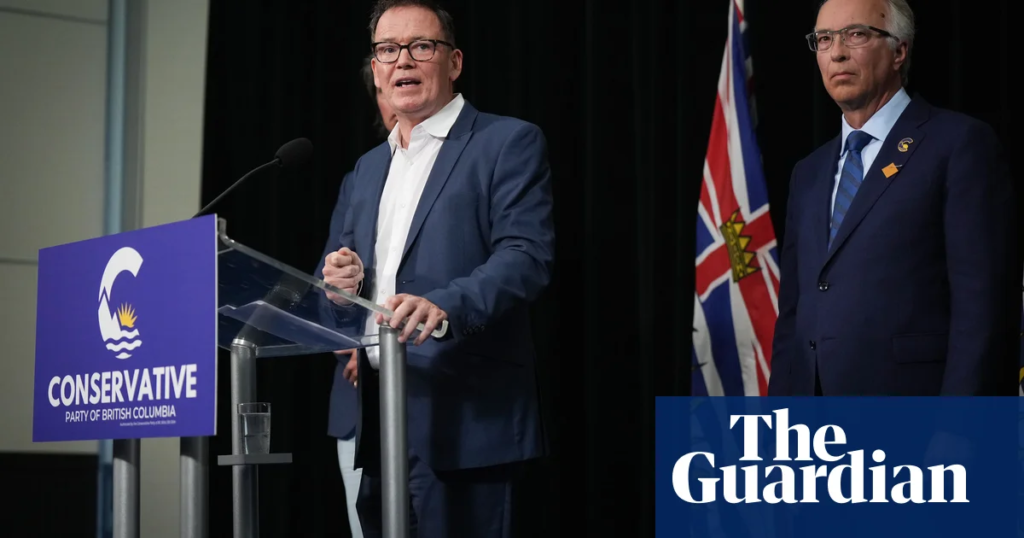Introduction: BC United Rebranding
As British Columbia heads into its provincial election on October 19, 2024, the political climate is charged with intense drama and high stakes. This election, marked by sudden changes and strategic maneuvers, has far-reaching implications for the province’s approach to climate policy and Indigenous rights. In this detailed analysis, we’ll explore the major players, key issues, and potential outcomes of this pivotal election.

The NDP’s Climate Policy Struggle
The New Democratic Party (NDP), led by Premier David Eby, has been at the helm of British Columbia’s government since 2017. Under Eby’s leadership, the NDP has pursued an aggressive climate agenda aimed at mitigating the effects of climate change. This includes ambitious targets for reducing carbon emissions and protecting natural habitats.
Despite these efforts, the NDP faces criticism for the perceived inefficacy of its climate policies. The party’s track record has been questioned, with some voters and analysts arguing that the implemented measures have not significantly addressed the environmental challenges facing the province. Recent opinion polls reflect a growing discontent among voters regarding the effectiveness of the NDP’s climate strategy.
BC United’s Rebranding Debacle
BC United, previously known as the BC Liberal Party, has undergone a dramatic rebranding under the leadership of Kevin Falcon. The rebranding was part of an effort to modernize the party’s image and attract a broader electorate. However, the transition has been fraught with difficulties.
Despite investing C$1 million in a rebranding campaign, BC United struggled with name recognition and voter confusion. Internal surveys indicated that around 30% of party members were unfamiliar with the new name, leading to further complications. The party’s difficulties were compounded by Falcon’s recent decision to suspend the campaign and endorse John Rustad of the Conservative Party of British Columbia.
The Rise of the Conservative Party
The Conservative Party of British Columbia, led by John Rustad, has gained traction amidst the political turmoil. Rustad, a former BC Liberal, has been criticized for his controversial views on climate change, including skepticism about the severity of the crisis. Despite these controversies, Rustad has leveraged anti-incumbent sentiment to boost his party’s profile.
Rustad’s strategy includes forming unconventional alliances, such as with former Green Party leader Andrew Weaver. Weaver’s endorsement, despite his differing views on climate policy, underscores a broader dissatisfaction with the current political establishment.
Implications for Climate Policy and Indigenous Rights
The outcome of the 2024 election holds significant implications for climate policy and Indigenous rights in British Columbia. Recent legislative efforts aimed at protecting 30% of the province’s land and water by 2030 and advancing co-management of public lands with Indigenous nations could be at risk if the Conservatives gain power.
Environmentalists and Indigenous advocates, such as Torrance Coste of the Wilderness Committee, have expressed concerns about the potential rollback of these policies. Coste argues that such a move would undermine critical progress in environmental protection and Indigenous sovereignty.
Recent Developments and Updates
As of September 2024, the election landscape continues to shift. The Conservative Party has rapidly absorbed key BC United candidates, strengthening its position. Recent polls show a tight race between the NDP and Conservatives, reflecting the dynamic and unpredictable nature of the campaign.
Full Timeline of Key Events
- August 2023: BC Liberal Party is rebranded as BC United.
- July 2024: BC United requests that its former name be listed on the ballot due to low recognition.
- August 28, 2024: Kevin Falcon announces the suspension of BC United’s campaign and endorses John Rustad.
- September 2024: Conservative Party gains momentum and incorporates prominent BC United candidates.
Expert Opinions on the Election
Shachi Kurl, Executive Director of the Angus Reid Institute, noted: “The endorsement of John Rustad by Kevin Falcon has dramatically shifted the election dynamics. This move reflects a broader dissatisfaction with the current administration and highlights the unpredictable nature of this election.”
Torrance Coste, Campaigner with the Wilderness Committee, commented: “The potential rollback of climate and Indigenous policies is a major concern. The Conservative Party’s stance could significantly impact ongoing efforts to address environmental and Indigenous rights issues.”
Conclusion
The 2024 provincial election in British Columbia is a crucial moment that will determine the future direction of the province’s climate policies and Indigenous rights initiatives. As voters head to the polls on October 19, they face critical choices that will shape the trajectory of British Columbia’s environmental and political landscape.
For Regular News and Updates Follow – Sentinel eGazette
FAQs
- What led to the rebranding of the BC Liberal Party to BC United? The rebranding aimed to modernize the party’s image and broaden its appeal. Despite significant investment, the new name struggled with recognition among voters.
- What are the key climate policies threatened by a potential Conservative victory? A Conservative win could jeopardize recent efforts to protect 30% of the province’s land and water by 2030 and co-manage public lands with Indigenous nations.
- Why did Kevin Falcon suspend BC United’s campaign? Falcon suspended the campaign to prevent vote splitting with the Conservative Party, leading to his endorsement of John Rustad to consolidate right-wing support.
- What is John Rustad’s position on climate change? Rustad has been criticized for his controversial views on climate change, including skepticism about the crisis’s severity, despite being a key player in the Conservative Party.
- How has Andrew Weaver’s endorsement affected the election? Andrew Weaver’s endorsement of John Rustad, despite differing views on climate policy, highlights a growing dissatisfaction with the current administration and adds complexity to the election dynamics.